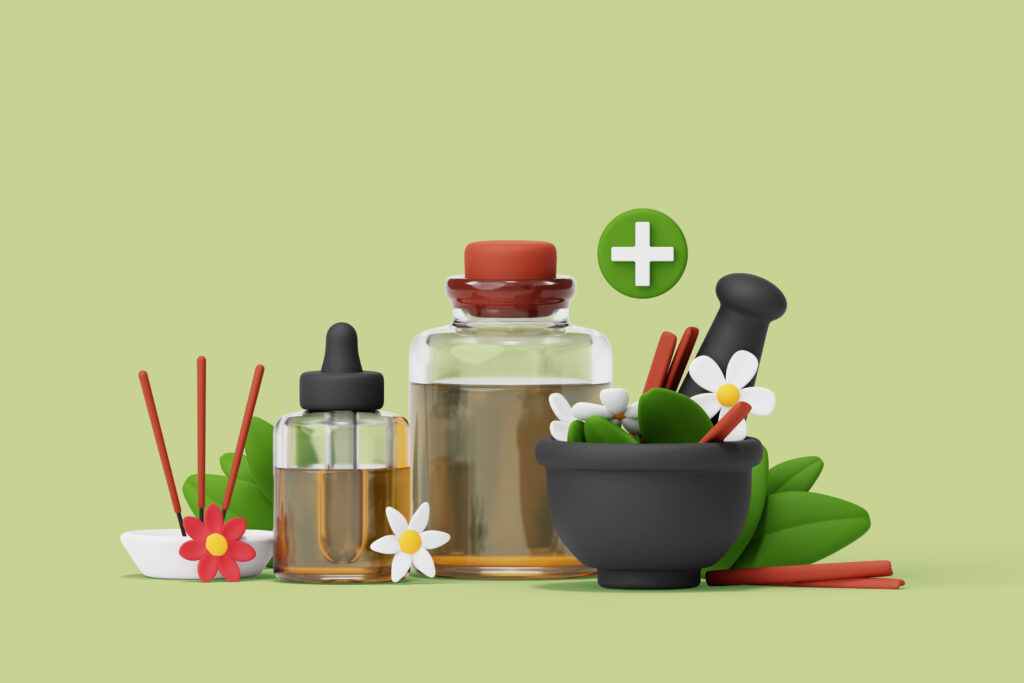“Herbal medicine blooms, In the garden of wellness, Whispering the secrets of the earth, Creating a symphony of well-being in harmony with nature.”
Herbal Medicine:

Plant-based medicinal goods, sometimes referred to as botanical or phytotherapeutic medications, are considered herbal medicines. Because of these traditional treatments’ purported medicinal benefits, many cultures throughout the world have been using them for ages. Herbal remedies can be made from a variety of plant components, including leaves, flowers, roots, seeds, and stems. They can also be made into teas, tinctures, capsules, powders, or ointments.
Natural chemicals produced by plants, such as alkaloids, flavonoids, terpenes, and polyphenols, are frequently the active ingredients in herbal treatments. These substances may have a role in the medicinal benefits of the herbs.
Commonly Used Herbal Medicines:
Several herbal medicines are commonly used worldwide for various health purposes. Keep in mind that the popularity of specific herbs can vary across cultures and regions. Here are examples of some commonly used herbal medicines:
1-Echinacea (Echinacea purpurea):
Frequently used to boost immunity, especially in the event of respiratory infections and colds.
2-Ginseng (Panax ginseng):
Reputation for having adaptogenic qualities; thought to improve energy and assist the body in managing stress.
3-Turmeric (Curcuma longa):
Includes curcumin, which is well-known for its antioxidant and anti-inflammatory qualities.
4-Ginkgo Biloba:
Frequently used to promote blood circulation, strengthen memory, and assist cognitive function.
5-Garlic (Allium sativum):
Frequently utilised to support cardiovascular health; thought to assist in lowering blood pressure and cholesterol.
6-Chamomile (Matricaria chamomilla):
Often used to encourage sleep and relieve intestinal discomfort, this herb is well-known for its calming and relaxing effects.
7-Aloe Vera:
Used topically to burns, wounds, and skin irritations due to its calming effects.
8-Peppermint (Mentha piperita):
Helps promote better digestion; relieves IBS symptoms; and gives a cooling feeling.
9-Valerian (Valeriana officinalis):
Used as a natural sedative to enhance sleep and encourage relaxation.
10-Saw Palmetto (Serenoa repens):
Often used to promote prostate health and reduce Benign Prostatic Hyperplasia(BPH) symptoms.
11-St. John’s Wort (Hypericum perforatum):
Used historically to treat mood disorders and mild to moderate depression.
12-Milk Thistle (Silybum marianum):
Frequently used to promote liver health and shield the liver from pollutants.
Use of Herbal Medicines:
Using herbal medicines involves careful consideration of the specific herb, its intended purpose, and individual health conditions. Here are general guidelines on how herbal medicines can be used:
1-Consult with a Healthcare Professional:
See a healthcare provider before using any herbal medicine in your routine. Based on your medical history, current ailments, and any drugs you may be taking, they can offer advice.
2-Choose High-Quality Products:
Choose herbal items that come from reliable vendors to guarantee their quality and purity. Steer clear of items with ambiguous ingredient lists or questionable promises.
3-Understand Dosage and Form:
Observe the suggested dosage guidelines found on the product’s label, or follow a doctor’s advice. Herbal remedies are available in a number of forms, such as topical treatments, tinctures, teas, pills, and extracts. Observe the form that is suggested for your particular requirements.
4-Consider Individual Responses:
Herbal medicines may have varying effects on various people. Before increasing, start with a smaller dose and see how your body responds. If you encounter any negative effects, stop using the product and get medical advice.
5-Be Patient:
Herbal remedies may take some time to start working, in contrast to some conventional prescriptions that provide instant relief. When taking the prescribed dose, use patience and consistency.
6-Be Mindful of Interactions:
Certain herbal remedies may interact with pharmaceutical drugs. To prevent any possible interactions, let your healthcare professional know about all the supplements and herbs you take.
7-Use as Complementary Care:
Complementary or alternative therapies frequently employ herbal remedies. For severe illnesses, they shouldn’t take the place of traditional medical therapies. Rather, they might promote general health and wellbeing.
8-Tailor to Individual Needs:
Herbs have several uses. Make sure your herbal selections support your particular health objectives. For instance, chamomile to promote relaxation, ginger to aid with digestion, or echinacea to strengthen the immune system.
9-Practice Caution During Pregnancy and Nursing:
Those who are nursing a baby or pregnant should use herbal medications with caution. Not all herbs are safe to use during certain times, thus consulting a physician is necessary.
10-Monitor for Allergic Reactions:
Keep an eye out for any symptoms of an allergic reaction, such as swelling, itching, or rash. If you encounter any symptoms, stop using the product and consult a doctor.
Remember that while herbal medicines have been used for centuries, scientific evidence supporting their efficacy can vary. It’s crucial to approach their use with a well-informed perspective and under the guidance of a healthcare professional.
For more interesting blogs, visit: Wellnesio.com and blog page
